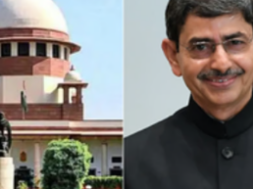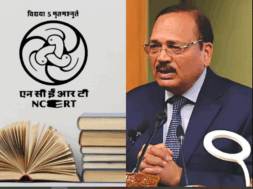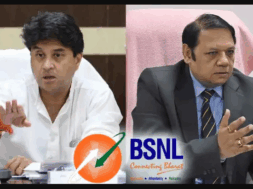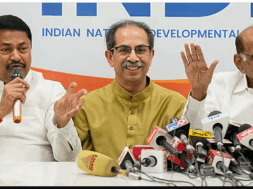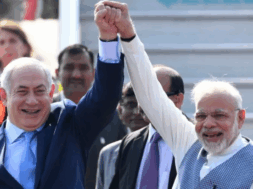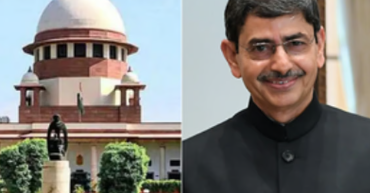
Manas Dasgupta
NEW DELHI, Nov 20: The Supreme Court on Monday virtually closed all doors for the Tamil Nadu governor RN Ravi to play any further tricks with the 10 bills he was holding back for nearly three years and said he was now left with no other option but to give his assent to the bills to convert them to acts.
Asking tough questions of the governor as to what was he doing for over three years when the court resumed hearing the Tamil Nadu government’s plea against delays in clearing bills, the Supreme Court observed that the Constitution did not provide Tamil Nadu Governor R.N. Ravi “discretion” to withhold Bills “re-passed” by the State Legislative Assembly. “Once they have been re-passed, the 10 Bills are put in the position of Money Bills. Then you [Governor] cannot reject,” Chief Justice of India D.Y. Chandrachud remarked.
The court seemed to prima facie agree with argument raised by the State, represented by senior advocates A.M. Singhvi, Mukul Rohatgi, P. Wilson and advocate Sabarish Subramanian, that the first proviso of Article 200 States that “if the Bill is passed again by the House or Houses with or without amendment and presented to the Governor for assent, the Governor shall not withhold assent therefrom.”
The court clarified that the Governor loses his power to refer the 10 reiterated Bills to the President once he withholds consent and returns the Bills to the House. The Bills had been sent for approval to the Governor’s office between January 2020 and April 2023. The State had complained to the court that the Governor was holding them back indefinitely, defeating the rights of the people of Tamil Nadu to the benefits of crucial laws passed by the House.
The court – hearing similar pleas by the Punjab and Kerala governments – also raised a point of law – “can a Governor withhold assent on a bill without sending it back to the Assembly?” The court’s strong observations come days after Mr Ravi returned ten bills – two of which were passed by the earlier AIADMK government. A furious Tamil Nadu Assembly then held a special session on Saturday to re-adopt all ten bills, which were sent back to the Governor for his assent.
The court noted this development and said, “Assembly has passed the bills again and sent it to the Governor. Let us see what Governor does,” as it adjourned the matter till December 1. “Once bills are re-passed, they are on the same footing as money bills,” the court pointed out.
In its approach to the court, the ruling DMK said the Governor’s actions were “undermining the will of the people” by deliberately delaying bills sent for clearance and asked for a specific timeframe. Most of the bills aim to clip powers of the Governor in appointing vice chancellors to state universities, in his role as Chancellor. The ruling DMK wants to make the Chief Minister as Chancellor.
In today’s hearing, there was a back-and-forth between senior advocates Abhishek Singhvi and Mukul Rohatgi (representing the Tamil Nadu government) and the Solicitor-General Tushar Mehta (arguing for Mr Ravi). “The Governor returned the bills stating ‘I withhold assent’ without giving any reason… The Governor has violated every word of the Constitution,” the former two argued.
To this, the Solicitor-General replied, “The Governor is not a mere technical supervisor.” The court noted that Mr Ravi had assented to 162 of 181 bills presented to him. The court also noted the Governor of any state, under Article 200, has three options – assent to bills presented to him, withhold that assent, or send it to the President of India.
“The proviso says Governor may send it to state government for reconsideration,” the court added. “Can the Governor withhold assent on a bill without sending it back to the Assembly?” it asked.
Mr Ravi had earlier also returned the NEET Exemption Bill, after much delay, and forwarded it to the President of India only after the Assembly passed the bill again. He adopted a similar stance over a bill seeking a ban on online gaming. “Withholding bills is a courteous way of saying no…” he said.
Kerala and Punjab have also moved the Supreme Court against their respective Governors. With reference to the latter, last week the court had cautioned the governor Banwarilal Purohit of “playing with fire” while in the Kerala plea, the court has sought responses from the centre and Governor Arif Mohammed Khan.
During the hearing in the case against Tamil Nadu governor, Rohtagi pointed out that “The Governor returned the Bills with just one line ‘I withhold consent’. What was the Assembly supposed to do? So, the House re-passed the Bills… The Governor has to return the Bills with a message spelling out reasons why he has returned the Bills,” Mr Rohatgi pointed out. Mr Singhvi said the Governor neither returned the Bills with a “message” suggesting amendments to the proposed laws nor citing reasons for withholding his consent. Besides, he sat on the Bills indefinitely for nearly three years.
“The Governor says he disposed of the Bills on November 13, 2023. Our order issuing notice to the petition [filed by Tamil Nadu] was on November 10. These Bills have been pending since January 2020. The Governor took action only after we issued notice in the matter. Why should Governors want parties to move the Supreme Court to start taking steps? In this case, what was the Governor doing for three years,” Chief Justice Chandrachud asked Attorney General R. Venkataramani.
Mr Wilson urged the court to fix a time limit for Governors. “We have to run the governance of the State. Every time, we cannot come to the Supreme Court. Seven crore people are affected,” he submitted. Mr Singhvi said the Governor had to function within the State Legislature. “He cannot exercise a pocket veto,” the senior lawyer contended.
Mr Wilson said the Governor exercised his power of assent with the aid and advice of the Council of Ministers. He referred to the Constituent Assembly debates to highlight the statement made by T.T. Krishnamachari, the Member from Madras and later Finance Minister, that a “Governor cannot act on his own, he can only act on the advice of the Ministry… When a Governor sends a Bill back for further consideration, he does so expressly on the advice of his Council of Ministers.”
Mr Krishnamachari had explained that if the Bill passed by the Legislative Assembly needed modification or had been a product of hasty action or had garnered adverse public opinion, the government used the Governor to return the Bill to the Lower House as quickly as possible for re-legislation. The first proviso to Article 200 was thus a “saving clause” and retained the power and discretion over the fate of the Bill solely in the hands of the State Cabinet.
A battery of non-BJP ruled States have approached the Supreme Court accusing their Governors of using a non-existent discretion to unreasonably delay the passing of crucial Bills into law. The Bills in limbo cover sectors such as public health, higher education, Lokayukta and cooperative societies.
Tamil Nadu has accused Governor Ravi of toying with the citizens’ mandate by sitting on the Bills by neither assenting nor returning them. Kerala, in its separate petition, said eight proposed laws passed by its Legislative Assembly were pending with the Governor, not for months, but years. Of the eight, three Bills were waiting for the Governor’s word for over two years.
Punjab complained that seven of its Bills were stuck with the Governor since June, threatening to bring the administration to a “grinding halt.” The Supreme Court had to intervene in April for the Telangana Governor to clear Bills pending since September 2022, compelling advocate Dushyant Dave, appearing for the State, to submit that legislatures in Opposition-ruled States were at the mercy of the Governors, who had become a law unto themselves.
Grievances have also been expressed by the non-BJP governments in West Bengal, Chhattisgarh, Delhi and several other states over their tussle on various counts with the BJP government-appointed governors,
